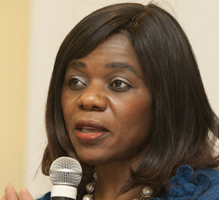
“If there is political will we will eradicate corruption in this country,” proclaimed Steven Powell, a former specialist prosecutor for the Department of Justice and director of the forensics arm of law firm Edward Nathan Sonnenberg.
“We have to introduce an independent corruption fighting body that will investigate anyone without fear of victimisation.”
Powell was speaking at a roundtable discussion on corruption hosted by the Helen Suzman Foundation at the Johannesburg Country Club on 6 September. He hailed the disbanded Scorpions as the best corruption fighting unit the country had ever had.
His call for an independent body free of political interference was welcomed by speakers and attendees alike. “I think the public protector has done a sterling job but we actually need a corruption fighting body because at the moment we are at the brink of corruption becoming endemic in South Africa unless drastic action is taken,” he explained.
The aim of the roundtable discussion was to generate awareness of corruption, scrutinise the current definition of corruption, and look at what could be learnt from the history of corruption in South Africa. It was also important to assess the true extent of corruption and to explore ways in which business could contribute to the fight against corruption.
“Is there sufficient will in both government and businesses to fight corruption?” asked the foundation’s director, Francis Antonie. He reminded delegates that for corruption to take place there must be public servants willing to solicit or accept a bribe, as well as private individuals or companies to pay that bribe. Therefore, business had a big role to play in the fight against corruption.
Corruption in South Africa was not the action of isolated individuals; it was a phenomenon that was institutionalised, he added.
'Business must take responsibility too'
His sentiments were echoed by public protector Thuli Madonsela, who said: “Business South Africa must also take responsibility for corruption. Why are they giving business to politicians?”
Powell supported this view, explaining that any person in a position of authority had an obligation to report corruption if they came across it. If the corporate sector could be cleaned up, South Africa would have gone a long way in creating a less corrupt environment.
He added that although South Africa had good legislation regarding corruption, little effort had been put into marketing it effectively and often there were not enough people to ensure that the legislation was enforced.
Powell blamed the slow pace of eliminating corruption on prosecutors’ low salaries. They ended up leaving the public sector because it was not rewarding to work for the government. “We lose the talent the state should retain.”
Although South African legislation, like the UK Bribery Act, made provision for extra-territorial jurisdiction for contravention, which gave the country the power to prosecute South African countries that paid bribes in the rest of Africa, there weren’t enough resources to deal with acts committed locally, so it would take years before South Africa could effectively deal with companies that paid bribes in neighbouring countries.
'Government paying lip service to corruption'
Sunday Times investigative journalist Mzilikazi wa Afrika told the roundtable that not only did the government turn a blind eye and pay lip service to corruption, but it had also failed whistleblowers who exposed corruption. He criticised the government’s plan to pass the contentious Protection of State Information Bill. It would lead to the jailing of journalists and whistleblowers for 25 years for exposing corruption, instead of imprisoning corrupt officials.
“Corruption is not like Aids; it can be cured and stopped,” he lamented. “We don’t need a doctor, we don’t need a sangoma, and we don’t need a prophet to stop it. We need honest citizens, business people, men and women who will stand up to eradicate this ugly weed growing in our backyard.”
The roundtable also heard about the challenges facing the Public Service Commission (PSC) in fighting corruption. According to Dovhani Mamphiswana, the deputy director-general of integrity and anti-corruption in the PSC, in the past few years the commission had received over 9 000 cases relating to irregular procurements and tenders. To date no actions had been taken against the officials responsible.
He said government departments were supposed to have their own well-staffed and properly resourced anti-corruption units to ensure that once cases were referred to the department of investigations, they were indeed investigated thoroughly.
Even senior management officials in the PSC had not declared their business interests.
Madonsela told delegates that while corruption was not new – it had been around even before apartheid – it had evolved, becoming more sinister and rife. However, she added that South Africa was not losing the fight.
“We are not losing the war against corruption. Increasingly whistleblowers and ordinary people are taking a stand,” she said. “Let’s all play our part in fighting corruption.”

